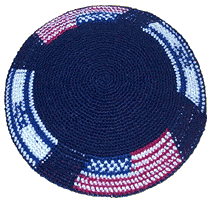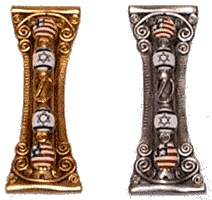 July 06
July 06
Israeli-American
Yoav Fisher
 I sat with my uncle outside Boudin Bakery on Ofarrell drinking cappuccino and sharing a scone. It was a glorious Saturday afternoon in downtown San Francisco; warm but not humid, sunny but not glaring. The sky was the idyllic blue that's never seen in New York or Los Angeles, and the entire city, tourists and locals, was enjoying the shops around Union Square.
I sat with my uncle outside Boudin Bakery on Ofarrell drinking cappuccino and sharing a scone. It was a glorious Saturday afternoon in downtown San Francisco; warm but not humid, sunny but not glaring. The sky was the idyllic blue that's never seen in New York or Los Angeles, and the entire city, tourists and locals, was enjoying the shops around Union Square.
My uncle was in town for a medical conference at Stanford. He is a gastrointestinal surgeon at Hadassah Hospital in Jerusalem, and was staying at my parents' house in Palo Alto. He comes frequently to the States for such conferences, usually every four months, and we've shared the same routine of getting lunch and having a coffee every time. He has a penchant for any type of food that is not typically prevalent in Israel: Thai, Vietnamese, Mexican. Today was dim sum. We were discussing my upcoming move back to Israel in the fall for graduate studies.
“Why Israel?” he asked, “You can study economics anywhere.”
“I know,” I replied, “but I’ve been wanting to live in Israel as an adult for years, and I’ve been wanting to go back to graduate school for years, so why not do both at the same time?”
“You’re parents must be worried.”
“I’m sure they are, especially my mother. I think she’s kind of anti-Israel.”
“She’s not anti, she just remembers the Israel of her childhood, and she’s watched from the sidelines as the country has stagnated over the past 30 years.”
“Is that why every time we go back to visit for summer vacations she complains and tells me how hard it is to live there?”
“Look, Israel is not America. America is easy. You want internet in your apartment, you make a call, you want to buy new furniture, you get in your car and go to Ikea.”
”I know Israel is not America.”
“I know you do, but the vast majority of American Jews, including the children of Israelis, have no idea what the day to day is like. They come to Israel for Birthright or summer trips with their family and get pampered.”
A week earlier, I had been invited to my mother’s monthly book club meeting for the first time. The topic was the newest novel from Eshkol Nevo, a young author who was gaining a lot of notoriety in Israel. I devoured the novel in a week in order to convince my mother to let me attend, as she is very protective of her book club. I had always wanted to join in one of the meetings, partially out of curiosity and partially because I felt some deeper need to reconnect with current Israeli culture
The house was packed: 40 chairs set in two concentric circles in the living room, with so many desserts on the coffee table that there was no room for anything else. The guests were all familiar to me from my parents’ social circle in the South Bay. They were the typical Israeli baby boomers working in the high tech industry; the mid-fifties to early-sixties set, well established, with kids in their late teens to mid twenties, living the pre-retirement years on comfortable salaries, well-diversified 401Ks and mesh chairs with lumbar support.
The book club was just one outlet in a long string of overlapping social events shared by the Israeli community of the area. They check out the same books from the Hebrew library at the Cubberly Community Center, they go to lectures together thrown by the Consulate, they hike the hills behind Stanford together, and they all get pita from the same Lebanese grocer in Mountain View. They are as distinct from the larger Jewish community as they are from the other ethnic groups in the region. While the American Jewish population of the Bay Area is connected through various temples, youth groups, or one of the few large summer camps, the Israelis immigrants of my parents' generation are characteristically isolationists. They seem to mix at the office or in Pilates class, but the second they get home they remove the mask and cease association with other ethnicities, even with other American Jews.
“Look at your little sister, for example,” continued my uncle, “She comes to visit for two weeks every summer and has a great time and we love to see her, but do you really think she could up and move to Tel Aviv and find a job and an apartment? She barely speaks Hebrew. She doesn’t read or write the language. All the Hebrew she heard growing up was `Did you do your homework? ` and `When are you coming home?’”
“Most of my friends who are children of Israelis are like that” I replied.
“Exactly. The truth is that they are secular American Jews, not Israelis. And you know as well as I do that American Jews and Israelis are completely different things”.
I thought how angry my "secular American Jewish" friends would be to hear this, to have an Israeli refer to them as American. It also struck me as odd to refer to them as American Jews, as even my most Americanized Israeli friends were still somewhat distinct. Regardless of religious denomination, American Jews all seemed to be connected through latent Eastern European Ashkenazi idiosyncrasies. One could be a Reconstructionist and the other could be Conservadox, yet they both would laugh at how much Larry David reminds them of their father. The Israelis, on the other hand, feel little kinship toward these quirks. Many also referred to themselves as “Israeli Americans”, which always struck me as a little odd. It seemed like a trite manifestation of the general need of the Y-generation to create a sense of uniqueness and individuality, and less from a genuine sense of rootedness and connection to Israel. 
“Then how do you explain my situation?” I said, in defense of my friends, “And the fact that I’m going back after nearly 20 years in the States?”
“You are the anomaly,” my uncle responded, “I have no idea why you are so mixed, but you have to admit that you’re weird fascination with Israel is not normal among your generation.”
“How do you figure?”
“C’mon… how many other kids do you know voluntarily attend their mother’s book club?”








